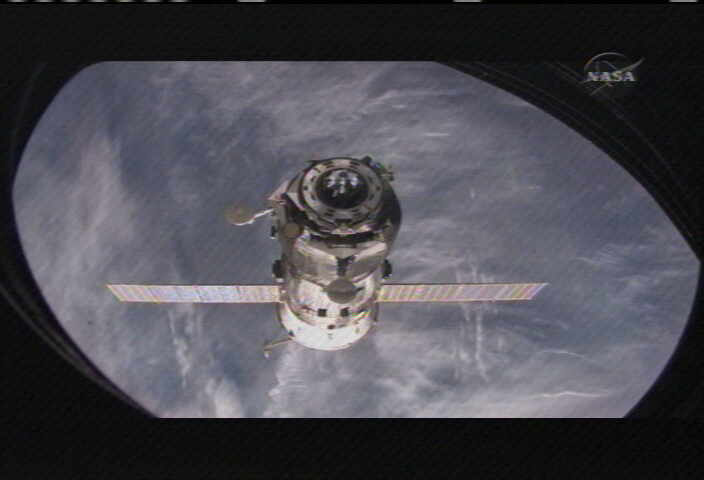Space Station Crew Discards Russian Cargo Ship

Astronauts aboard the International Space Station (ISS) jettisoned a Russian cargo ship packed with trash early Monday to clear a parking spot for an incoming crew.
The unmanned space freighter Progress 28 undocked from its Earth-facing berth on the station's Russian-built Pirs docking compartment at 4:50 a.m. EDT (0850 GMT), freeing up the port for the planned April 10 arrival of three new astronauts, NASA officials said.
Three hours later, the Progress 28 spacecraft fired its rocket engine to begin a fiery plunge through the Earth's atmosphere that ended with its intentional destruction over the Pacific Ocean. Russian space officials said some debris survived reentry, but splashed down well away from populated waters.
"The drop zone for spaceship fragments, which did not burn in dense layers of the atmosphere, was located away from navigation routes, about 3,000 kilometers east of the New Zealand capital city of Wellington," Russia's Federal Space Agency spokesperson Valery Lyndin told the Russian Interfax News Agency.
Expedition 16 station commander Peggy Whitson and flight engineers Yuri Malenchenko and Garrett Reisman salvaged the Progress 28's Kurs automated docking system hardware for return to Earth before loading the space freighter with trash and unneeded equipment, Lyndin said.
The astronauts also began unloading their newest cargo ship — the European-built space freighter Jules Verne, which docked last week — early Saturday, NASA officials added.
The disposal of Progress 28 clears the way for the arrival of a new Soyuz TMA-12 spacecraft carrying Expedition 17 commander Sergei Volkov, flight engineer Oleg Kononenko and So-yeon Yi, South Korea's first astronaut.
Get the Space.com Newsletter
Breaking space news, the latest updates on rocket launches, skywatching events and more!
Yi and the Expedition 17 crew are poised to launch toward the station on Tuesday at 7:16 a.m. EDT (1116 GMT). They will lift off atop a Russian-built Soyuz rocket from the Central Asian spaceport of Baikonur Cosmodrome in Kazakhstan.
Volkov, a second-generation cosmonaut, and Kononenko will relieve Whitson and Malenchenko, who are nearing the end of a six-month mission aboard the station that began last October. Reisman will aboard the ISS to join the Expedition 17 crew.
Yi, a 29-year-old mechanical engineer, will fly a 10-day mission to the station under a commercial agreement between Russia's Federal Space Agency and the South Korean government. She is due to return to Earth on April 19 with Whitson and Malenchenko aboard their Soyuz TMA-11 spacecraft.
NASA will broadcast the launch of Expedition 17 toward the ISS live on NASA TV beginning at 6:15 a.m. EDT (1015 GMT). Click here for SPACE.com's NASA TV feed and live ISS mission updates.
Join our Space Forums to keep talking space on the latest missions, night sky and more! And if you have a news tip, correction or comment, let us know at: community@space.com.

Tariq is the Editor-in-Chief of Space.com and joined the team in 2001, first as an intern and staff writer, and later as an editor. He covers human spaceflight, exploration and space science, as well as skywatching and entertainment. He became Space.com's Managing Editor in 2009 and Editor-in-Chief in 2019. Before joining Space.com, Tariq was a staff reporter for The Los Angeles Times covering education and city beats in La Habra, Fullerton and Huntington Beach. In October 2022, Tariq received the Harry Kolcum Award for excellence in space reporting from the National Space Club Florida Committee. He is also an Eagle Scout (yes, he has the Space Exploration merit badge) and went to Space Camp four times as a kid and a fifth time as an adult. He has journalism degrees from the University of Southern California and New York University. You can find Tariq at Space.com and as the co-host to the This Week In Space podcast with space historian Rod Pyle on the TWiT network. To see his latest project, you can follow Tariq on Twitter @tariqjmalik.









